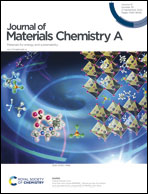Molecular engineering accelerated polarity switching enabling high-performance n-type organic thermoelectrics†
Abstract
Polarity switching from p- to n-type via simple p-doping can be realized by precisely regulating the molecular parameters of indaceno[1,2-b:5,6-b′]dithiophene-based copolymers. The theoretical calculations and experimental results sufficiently elucidate the critical factors for polarity switching. Consequently, a large-scale variety of Seebeck coefficients range from 265.8 ± 54.6 to −208.7 ± 0.6 μV K−1 is achieved by slightly changing the FeCl3 concentrations, affording a high power factor of 20.7 ± 0.7 μW m−1 K−2 (n-type).



 Please wait while we load your content...
Please wait while we load your content...